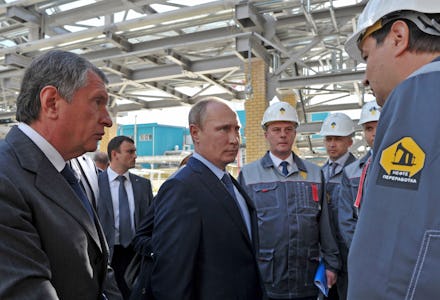Russia's Recent Oil Deal Reveals Its Softer Side

This week Russian energy giant Gazprom signed a deal with Ukrainian gas tycoon Dmytro Firtash's Ostchem. This is an indication to many foreign spectators that Russian is gaining influence in Ukraine. While Russia's history of playing power politics through its vast energy resources is not something new, these recent efforts underline a key trend in Russia's geo-strategy.
Ostchem, a private Ukranian gas company, is slated to purchase five billion cubic metres of Russian gas for underground storage at a discount of 30-36%. The deal comes amid fears in Ukraine of an insufficient number of gas reserves just before the winter when energy demands are expected to rise. In 2009, a price dispute between Moscow and Kiev resulted in Russia shutting down its pipeline, which left millions of Eastern Europeans without heat for three weeks in the dead of winter.
The timing of this agreement, however, indicates that it is more than another energy deal. Ukrainian President Viktor Yanukovych is set to sign a free trade deal with the E.U. next month. Such a pact would go against the Kremlin's ambitions of seeing Ukraine join its newly formed free trade Customs Union. Though a trade zone is not necessarily more appealing than that of the E.U.'s, the Customs Union's only signatures are Belarus, Kazakhstan, and Armenia. Russia was sure to offer a $750 million (€555 million) loan, along with the previously mentioned discount to sweeten the deal.
Joining the E.U. trade agreement would flood Ukraine's market with E.U. goods, and would put Russia's growing ambitions at a severe disadvantage as it tries to reformulate itself in its former sphere of influence. Geo-strategically, Ukraine offers Russia a surplus population of over 40 million people, some of whom share a forged sense of identity throughout ancient and modern history. Ukraine also offers Russia greater access to the Black Sea as Russia's Black Sea naval fleet is stationed in the Crimea and enables easier access to Southern and Central Europe. As one analyst put it, Russia by itself is a regional power, but Russia with Ukraine is a global power.
Hence the growing fears from the Kremlin of Kiev looking towards the E.U. are reflected in Russia's new softer stance on striking gas deals with energy-dependent Ukraine. Ukraine, the second largest buyer of Russian gas, pays more than any other of Russia's European buyers.
This rift between the East and West continues to stifle within Ukraine's domestic politics. The energy deal illustrates that Russia will not shy away from rewarding and sanctioning Ukraine should its decisions be counter-intuitive to Moscow.